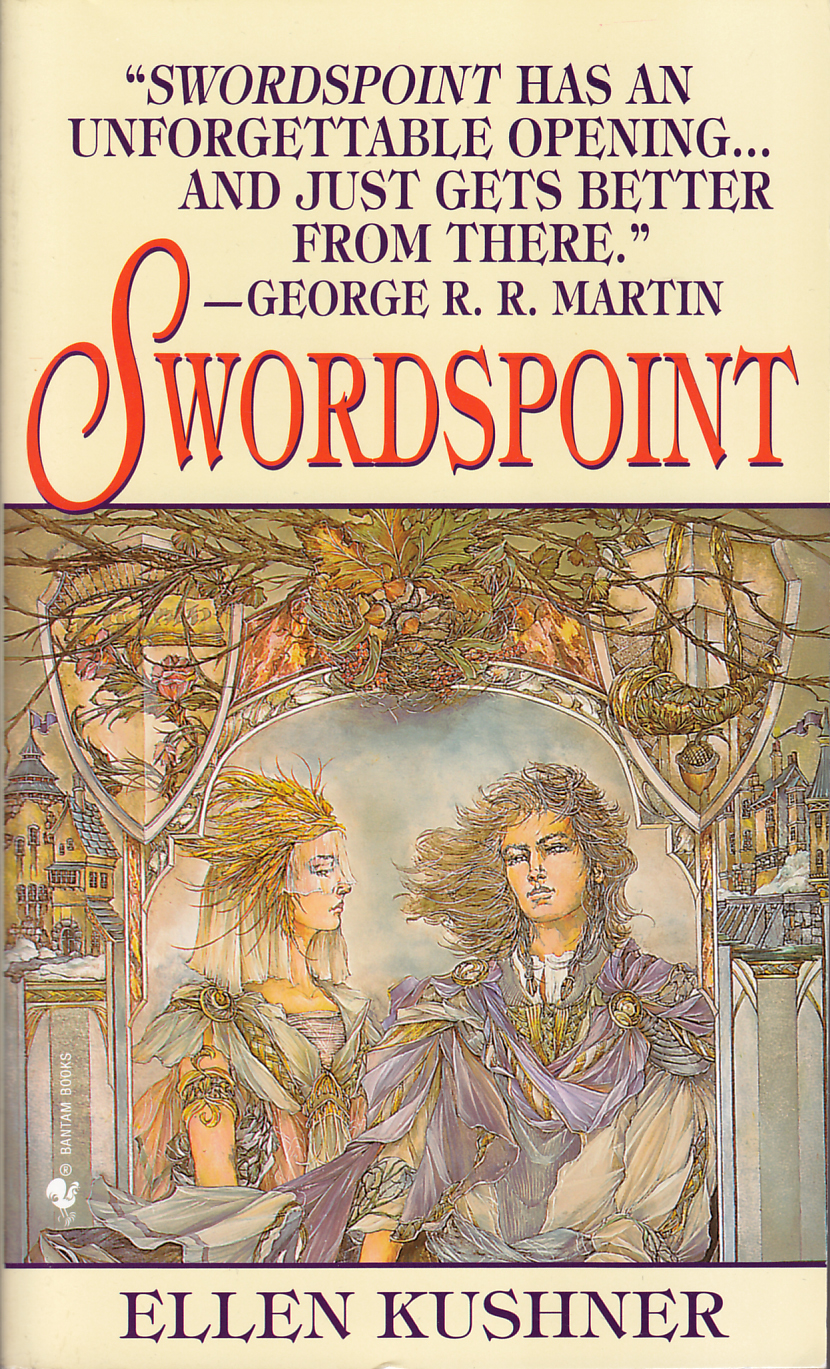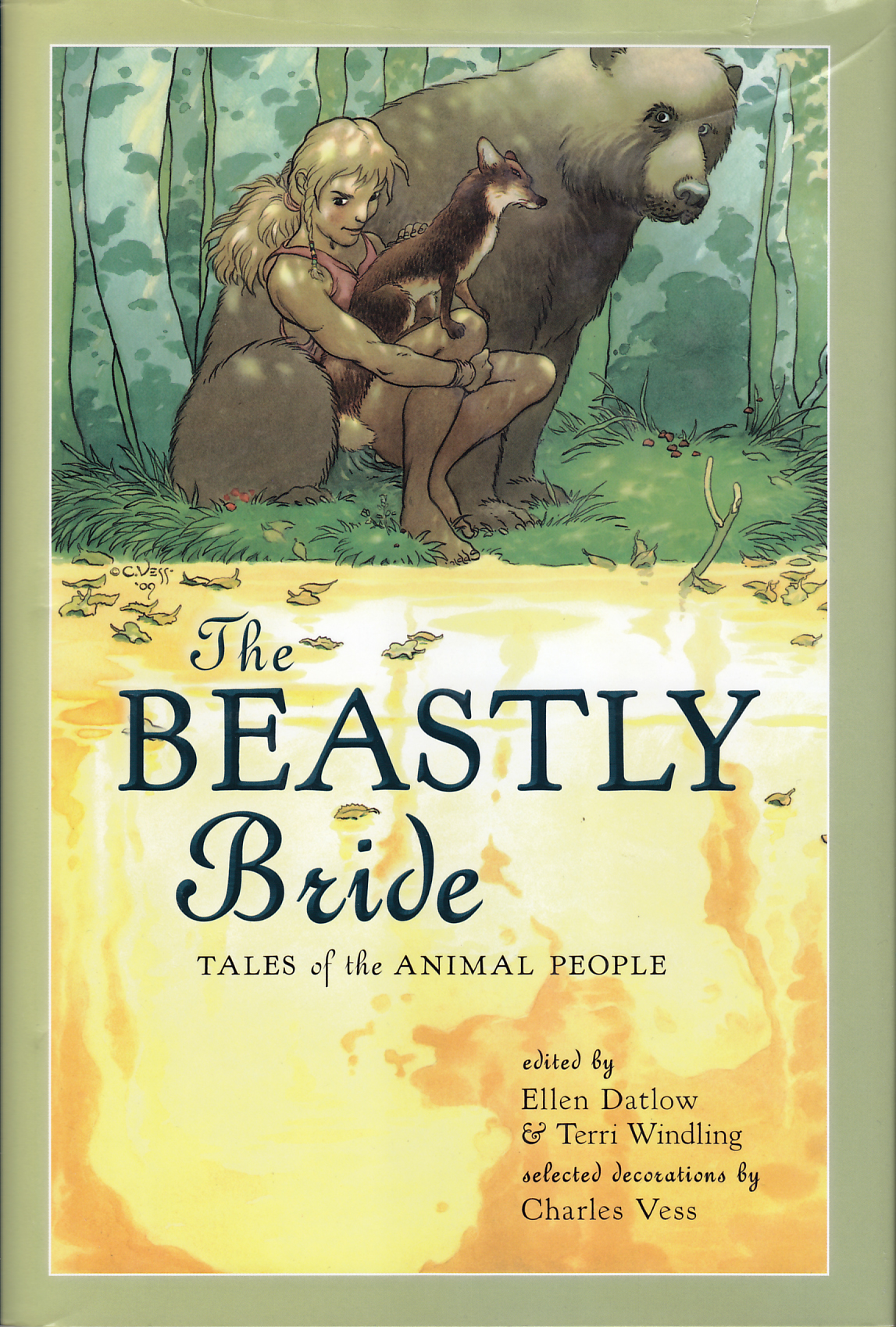Ellen Kushner
Books: Fantasy | Queer
Swordspoint (1987), The Fall of the Kings (2002), The Privilege of the Sword (2006), Tremontaine: Season One Volume One (2016)
Thomas the Rhymer (1990)
Borderland: Where Magic Meets Rock and Roll (1986), The Year's Best Fantasy and Horror: Seventh Annual Collection (1994), The Essential Bordertown (1998), The Coyote Road (2007), Troll's Eye View (2009), The Beastly Bride (2010), Naked City (2011), Teeth (2011), Under My Hat: Tales from the Cauldron (2012), Queen Victoria's Book of Spells (2013)
Swordspoint (1987)
Richard St Vier is a swordsman in a time and places where nobles hire swordsmen to fight their duels and to make points of honor. The system was originally created to formalize dueling, and to, one imagines, reduce the number of deaths that occurred because of dueling. Although a swordsman could challenge a noble to a duel, most duels occur between hired swordsmen.
And of those swordsmen, St Vier is the best. He will not take a written contract, relying upon the honor of the nobles who hire him to keep him from prison. St Vier's lover, Alex, is an enigma. Kicked out of the university, Alex lives seemingly only to offend those around him, which, much to his delight, frequently leads to St Vier killing those who would take action after taking offense.
But really, the writing is just gorgeous, drawing me in from the beginning.
The falling snow made it hard for him to see. The fight hadn't winded him, but he was hot and sweaty, and he could feel his heart pounding in his chest. He ignored it, making for Riverside, where no one was likely to follow him.
He could have stayed, if he'd wanted to. The swordfight had been very impressive, and the party guests and its outcome would be talked about for weeks. But if he stayed, the swordsman knew that he would be offered wine, and rich pastry, and asked boring questions about his technique, and difficult questions about who had arranged the fight. He ran on.
Under his cloak, his shirt was spattered with blood, and the Watch would want to know what he was doing up on the Hill at this hour. It was their right to know; but his profession forbade him to answer, so he dodged around corners and caught his breath in doorways until he'd left the splendors of the Hill behind, working his way down through the city.
Isn't that marvelous? This book makes me want to run out and take up fencing--except for the fact that I'm a complete klutz and would most likely end up impaling myself. Though it might be worth it.
Here is our introduction to Richard St Vier:
The blood lies on the snow of a formal winter garden, now trampled and muddy. A man lies dead, the snow filling in the hollows of his eyes, while another man is twisted up, grunting, sweating frog-ponds on the frozen earth, waiting for someone to come and help him. The hero of this little tableau has just vaulted the garden wall and is running like mad into the darkness while the darkness lasts.
And here is the introduction to Lady Halliday, who is only a minor character in the story, yet fully developed.
That single sentence tells us so much about Lady Halliday, and also about her husband, Lord Halliday.Lady Halliday was a quiet, shy young woman with none of her friend's fashionable talent for clever chatter. Her voice was generally low, her speech soft–just what men always claimed to want in a woman, but were never actually drawn to in the drawing room.
There is also so much commentary on the lives of the poor and of the rich made in passing so you almost miss the significance of it.
Look, get yourself some new socks; get yourself ten pairs, get them in silk. I've just been paid for the Lynch job. We're going to be very comfortable as long as it lasts.
I told him it was the wrong time of the year, but he said he couldn't change his birthday to suit the weather, and he has always been uncommonly fond of fireworks.
Of course, there are fabulous comments sprinkled through the story, such as Lord Christoper's comment "(T)he truth cannot be considered an insult." Or Richard's comment, "Everyone can be bribed…(y)ou just have to know their price."
"Just because he's an idiot doesn't mean his money's no good."
"You'd be surprised."
But mostly there are the passage that I love, for no reason other than they strike something in me.
Richard enjoyed his description of love; it was the most accurate part of the play so far, with its images of hot and cold, pleasure and pain. But at the same tie, it made him uncomfortable to hear someone talking about it in front of a great crowd of strangers–even though it was only a play.
It was hard to tell what he meant when he talked like that, as though he were making fun of himself for speaking, and you for listening.
And as a bonus, there are additional short stories in the back of the book, so not only do you get to read just a little bit more, the book gets to surprise you with its ending, as you don't realize it's something. (Which is one reason why I like books with previews in the back. Not because I read the previews--I don't--but because they allow the end of the book to sneak up on me, and there's something satisfying about that.
The strange thing about this book is that although it's labeled as fantasy, it isn't--not really. There is no magic, no faerie, no supernatural creatures--the only fantasy is that the world where Swordspoint takes place has never existed.
I love everything about this book. I love Alec and St Vier, I love the writing, I love the story, it's all wonderful and perfect and I could sit right back down and read it again and enjoy it just as much.
- May 2004 | Rating: 10/10
- June 2005 | Rating: 10/10
- August 2006 | Rating: 10/10
- June 2007 | NR
- December 2010: Rating: 10/10
- September 2011 | Rating: 10/10
- February 2013 | Rating: 10/10
- April 2018 | Rating: 10/10
Swordspoint (1987/2011) by Ellen Kushner (Author, Narrator) with Dion Graham, Katherine Kellgren, Robert Fass, Nick Sullivan, Simon Jones
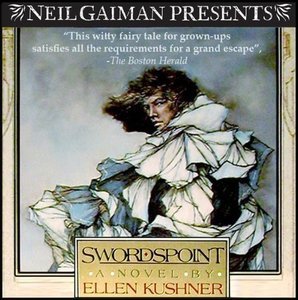 This review is of the audio recording of Swordspoint. Please check my review of the book Swordspoint for my thoughts on the story rather than the recording.
This review is of the audio recording of Swordspoint. Please check my review of the book Swordspoint for my thoughts on the story rather than the recording.
First, Ellen Kushner is the narrator, and like the recording of The Privilege of the Sword, I love her narration. She has a gorgeous speaking voice, and you know the tone and intonation of the dialog is spot on, since she's the one who heard their voices in her head originally.
The ensemble works very well during the scenes where there are multiple people–it makes it much easier to keep track of who said what.
My only quibble was Alec's voice. He never sounded like Alec to me. Both Richard and Alec sounded older than their supposed ages in the books, but I always assumed Richard was a bit older than Alec anyway, and Richard always felt more mature than Alec, so I quickly settled into That Voice being Richard. (And it is definitely a Very Nice Voice.)
But Alec? his voice just never felt quite right to me. Which is weird, because now I think about it, Ellen Kushner reading Alec's dialog seemed perfectly fine to me.
Then again, Alec is described as having auburn hair, and despite repeated reads, I can't help but see him as dark blonde in my mind.
So, this being one of my favorite books, I had high expectations. And–aside from Alec sounding too old to my brain–they were met. The ensemble cast definitely made the group dialog easy to follow, but I also would have been perfectly happy with just Ellen Kushner narrating the entire thing.
Published by Neil Gaiman Presents
September 2013 | Rating: 8.5/10
The Fall of the Kings (2002) with Delia Sherman
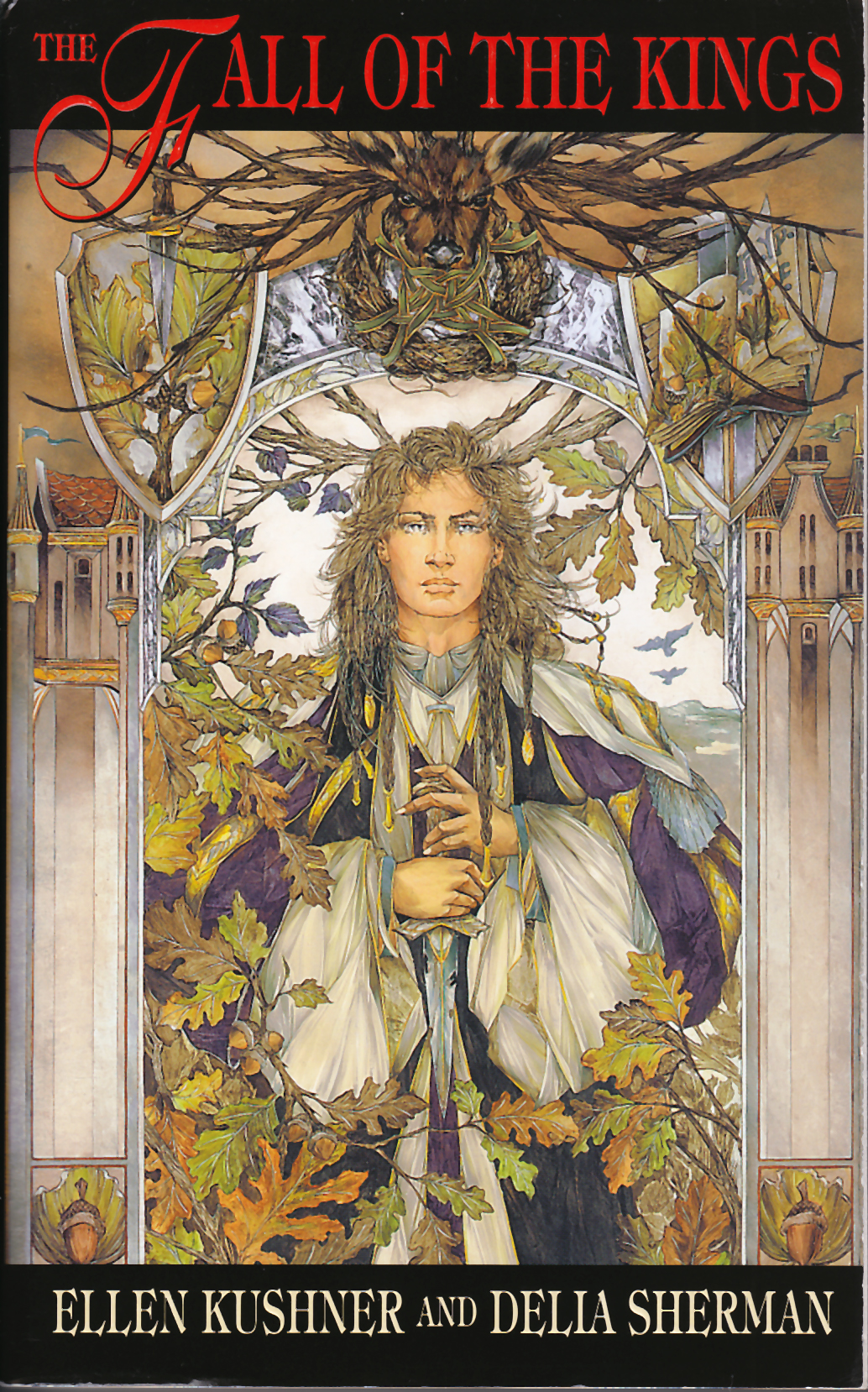 This book is set in the same world as Swordspoint, about two generations later. The story begins at the University, where Basil St Cloud is a young Doctor of History at the University. It is there that he meets Theron Campion, son of the Mad Duke and heir to Tremontaine.
This book is set in the same world as Swordspoint, about two generations later. The story begins at the University, where Basil St Cloud is a young Doctor of History at the University. It is there that he meets Theron Campion, son of the Mad Duke and heir to Tremontaine.
I liked this book far less than I liked Swordspoint, which means that it's still a good book, although not a great book. What kept it from being great is that I just didn't care as much about the main characters as I did in Swordspoint. I was fond of some of the secondary characters, especially Justis, but I just couldn't get really attached to the main characters. I almost felt as if the author(s) knew that she (they) was (were) going to do bad things to some of the characters, and so didn't want to get too attached, so that she (they) could go through with it.
The other problem I had was that there was just too much sex for my tastes. Sure it may necessary to describe the sexual relationship between characters, because of the relationship between Kings and Wizards in history; I just don't care to read about all the details. Of course it wasn't as bad as I'm making it sound, I just would have preferred more detailed sword fights and fewer detailed sex scenes. (Which right there tells you plenty about me I suppose.)
Tied in, is the fact that when some of the characters made claims of being in love, I just didn't believe it. Lust I could believe. Obsession I could believe. But love? The story would have been far stronger if I could have believed it was a love story. I just didn't.
Oddly enough, I enjoyed the bits about research and scholarship, but then I do work in academia, so that shouldn't come as a huge surprise I suppose.
But, all in all, the book had political intrigue, romantic intrigue, and a fantastic plot, so the it is is well worth reading, despite my misgivings.
Rating: 7/10
The Privilege of the Sword (2006)
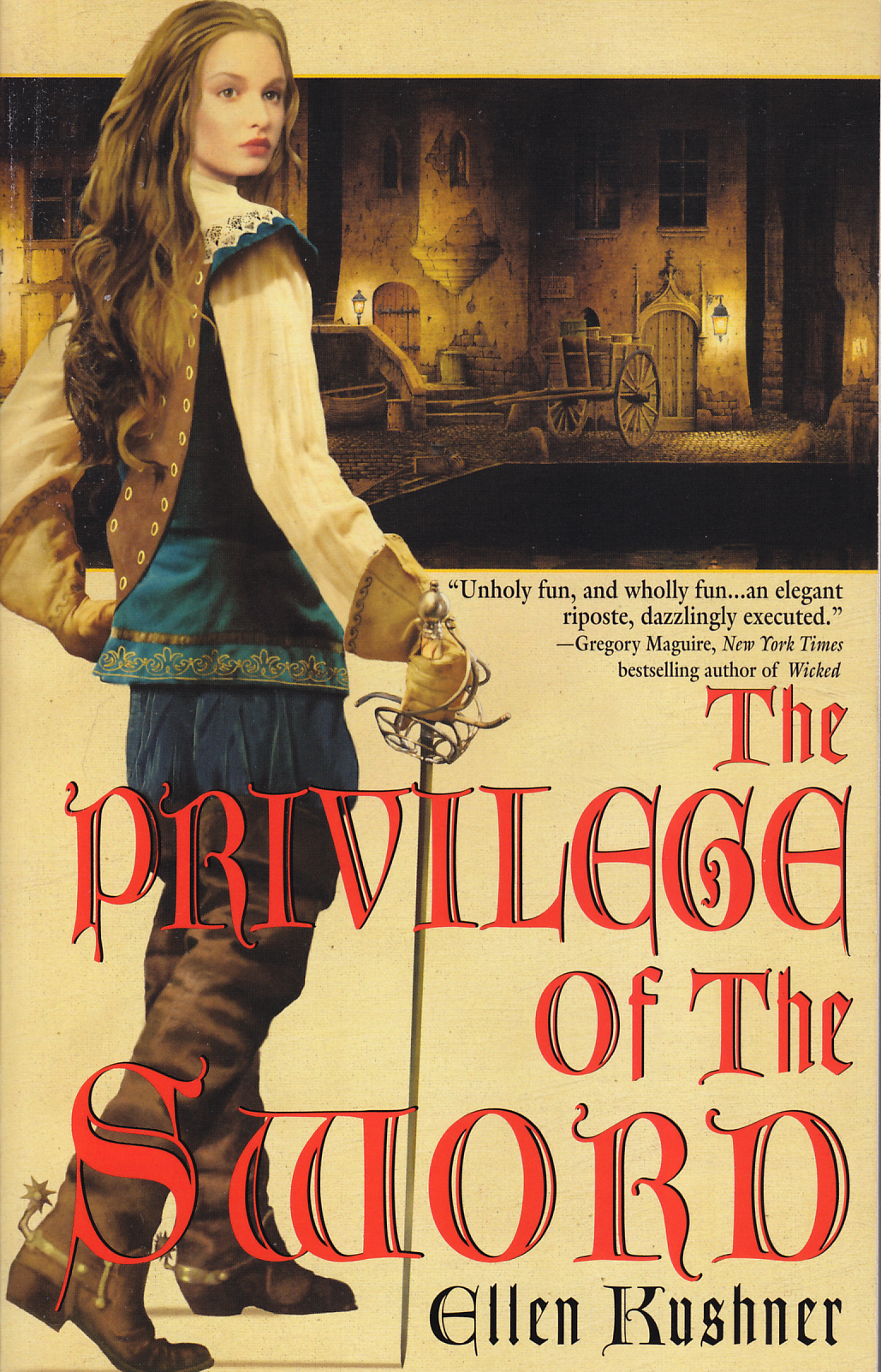 There are a handful of authors whose books I actively seek out, looking for crumbs of news of upcoming books: Sean Russell, Guy Gavriel Kay, Charles de Lint, and also Ellen Kushner. Well, July has been a good month for me; new Charles de Lint, and even more rare, a new Ellen Kushner book, The Privilege of the Sword.
There are a handful of authors whose books I actively seek out, looking for crumbs of news of upcoming books: Sean Russell, Guy Gavriel Kay, Charles de Lint, and also Ellen Kushner. Well, July has been a good month for me; new Charles de Lint, and even more rare, a new Ellen Kushner book, The Privilege of the Sword.
For those who have read Swordspoint, The Privilege of the Sword takes place in the same world, with some of the same characters. (And if you have not read Swordspoint, you should drop everything and read it now. It is damn near perfect.)
Katherine's family has always been on the edge of financial solvency, and the continual lawsuits by her uncle, the Mad Duke Tremontaine don't help. So it's a blessing for everyone when the Mad Duke offers to forgive the Talbert debt--as well as settling a sum of money on the family--if only Katherine will come live with him and study the sword--it's an offer her mother can't refuse.
The strange thing about The Privilege of the Sword is that initially I was somewhat disappointed. Katherine is interested in gowns and balls and all the other things that young women are interested in. And I... am not. As she complains of her dress and of her practice with the sword, in the back of my mind I wonder, "what's wrong with her?" Well, nothing. I just sometimes find it hard to remember that some people like dressing up and doing their hair and other dainty and feminine things.
Additionally, the more time Katherine spent with Alec, the more I missed St Vier.
I got over all that quickly enough.
Although Katherine wants gowns and beautiful things, she also wants to do the best for her family, and so she goes to Tremontaine House, and learns to fence. Although her uncle is strange, and she hates having to follow his every whim, she settles in rapidly enough, and eventually takes an interest in what she's learning.
And then the story takes off.
I had no idea where the story was going, and what was going to happen to Katherine. I remembered the outline of what happened to Alec and St Vier in Swordspoint, but I was missing lots of little details. Both of these things combined to create a story that was surprising and fascinating (and really made me wants to reread Swordspoint)
This is most certainly a worthy heir to Swordspoint, and you could easily read this without having read Swordspoint, and still understand everything that is happening. After all, we are seeing the world through Katherine's eyes, and she knows little of Alec or St Vier or the politics of the city. Having read the previous stories was a bonus--not a requirement.
Katherine Talbert's uncle is the Mad Duke Tremontaine, and when he offers to help her family financially if only Kate will come to the city, follow his rules, and learn the sword. As Kate is fifteen, this seems perfectly reasonable to her, so off she goes.
She really didn't have a clue what she had let herself in for.
(A)nd then the breeches–the buttons pulling closed flaps that were all that stood between me and the world, and nothing to hide my legs from anyone's eyes but the short hang of the jacket and the coarse stockings that revealed in outline everything the covered… Men's clothing gripped me in places I did not want, showed me in ways I could not like, claimed me with strange bindings and unbindings.
But of course, the reason I loved this story so well is seeing what became of Alec and St Vier.
Mostly Richard St Vier.
But we didn't spend much time with St Vier, and there are many surprises in store when we see him again. Of course Kate knows nothing about him.
I suppose being able to kill people was enough to make them very polite to you.
Alec, of course, hasn't changed at all, at least on the surface.
Ferris felt almost disappointed. If there were indeed the pornographic frescoes, instruments of torture, naked serving girls and other items popular opinion had decorated the duke's house with, they were not on public view.
Ah Alec.
Ah, but we also have Artemisia Fitz-Levy.
"Must all your friends beg you for favors, Lucius?" she teased. "You should be more generous!"
"You note," her cousin said to Lord Petrus, "she does not demur at being called a beauty!"
"That is because I know how free men are with their compliments, when they cost them nothing."
But of course, there were so many things that I loved, and things I wished to remember.
I let the insults go by. A good swordsman doesn't pay attention to words in a fight.
That's something I really should try to remember, even if I'm not about to get in a sword fight.
And then there was this:
If anything, I knew now that people were even stranger and more unpredictable than that, and that when we don't know the truth about someone, we will make it up ourselves.
There is sex in this book. Not a lot, and not extremely explicit, but it's there, so don't say I didn't warn you.
To sum up, this is an excellent book you must run out Right Now and get this book so that you can immediately start reading it. Because as much as I love listening to Sound and Spirit, I'd love more books even more. And if you haven't read Swordspoint, you really need to read that. In fact, I'm trying to fight off an urge to reread it myself; my to-read list grew substantially after my birthday, and I've got some catching up to do.
- July 2006 | Rating: 9/10
- June 2013 | Rating: 9/10
The Privilege of the Sword Audio Book (2012) Ellen Kushner (Author, Narrator), Barbara Rosenblat, Felicia Day, Joe Hurley, Katherine Kellgren, Nick Sullivan, Neil Gaiman
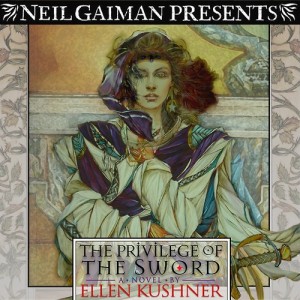 This is a review of the audio book. If you'd like a review of the story itself, that can be found here.
This is a review of the audio book. If you'd like a review of the story itself, that can be found here.
Audio books take quite a while for me to finish, because generally the only time I listen is when my walking partner is out or on a car trip.
That said, I do love well done audio books, and this one is pretty much perfect. Ellen Kushner does the narration from Kate's POV, and I believe it's Barbara Rosenblat who does Artemesia's POV, and for other scenes there is a case ensemble, including Neil Gaiman and Felicia Day (!).
As the main characters in this story are female, I liked having the female narrators, and I liked having the narrator switch during the scenes with Artemesia–it helped emphasize that we're somewhere else completely, for Artemesia's life is quite different from Kate's.
I highly recommend the audio version of The Privilege of the Sword, although I admit that once I reached a certain point, I ended up reading, so I could relive the story sooner. Because I have no patience. But then I kept on listening, and it didn't matter that I'd just re-read parts, because they were just as enjoyable.
Published by Neil Gaiman Presents
July 2013 | Rating: 10/10
Tremontaine: Season One Volume One (2016) by Patty Bryant, Joel Derfner, Alaya Dawn Johnson, Ellen Kushner, Malinda Lo, Racheline Maltese and Paul Witcover
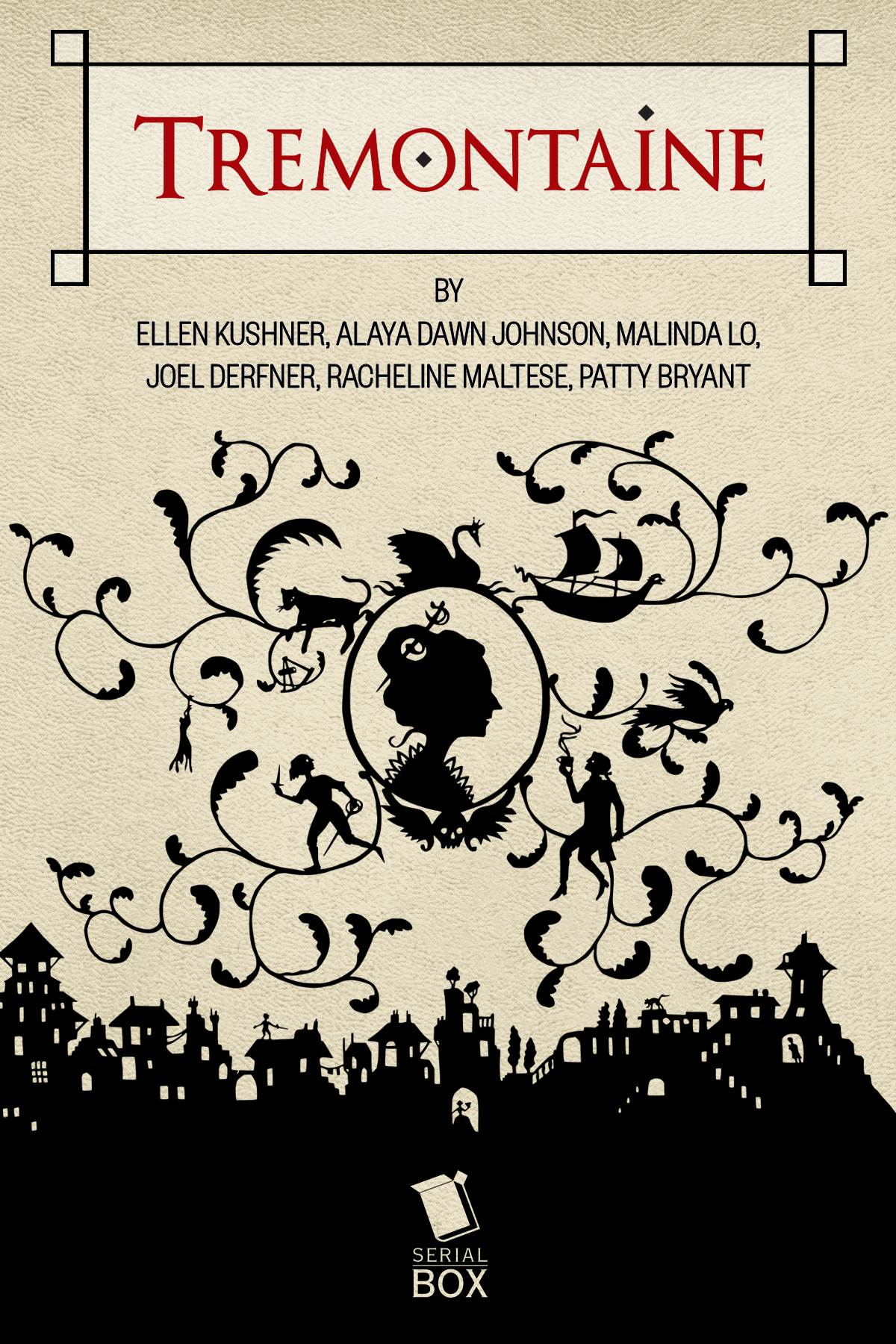 Let me explain… No, let me sum up.
Let me explain… No, let me sum up.
There is a book called Swordspoint by Ellen Kushner that is one of my favorites–a comfort read.
After Swordspoint came The Fall of the Kings, co-written with Delia Sherman, then came The Privilege of the Sword, which a sequel of sorts to Then there is Tremontaine, which is a prequel to Swordspoint, set years before, when Diane, the Duchess Tremontaine has not yet become the power behind the political machinations, although she is the power behind her husband's politics.
The duke had spent the better part of two decades not noticing things about his duchess, after all, and, unbeknownst to him, it had served him well.
But aside from Diane, there characters new to the series:
Micah the mathematical genius.
"Silver?" Tess shouted. "I'll give you twenty brass minnows, and that's more than they're worth."
"Ten silver, then, and I'll throw in a good linen shirt."
"Micah already has a shirt. Three."
Micah stopped paying attention. The numbers seemed random to her, and she didn't understand how Tess could make them change just by arguing about it.
Kaab the fallen daughter of Baalm chocolate traders.
"I am a first daughter of a first daughter of the Balam. I have been trained from birth to the service. I do not get lost." For very long, she amended internally, for honesty's sake. Confusing left and north didn't count.
Rafe Fenton the scholar and son of a local merchant.
"My argument is with my father, not with you. And as my father isn't here to listen, I'm afraid I have been rude to no purpose."
"But you would be rude to a purpose?" she asked. He blinked.
"Well... of course. Even my enemies would grant me that."
and many others.
We also get appearances by familiar characters including a younger Vincent Applethorpe.
It's interesting, though I will admit that I was initially unsure about Kinwiinik–the spelling of all the names and words were a bit much, but eventually I got used to the names and was able to keep people straight. Mostly.
The different chapters (or episodes) are written by different authors, so there is a different feel to each chapter, but it still flows well, and if some chapters I liked better than others, well, that's fine.
The first chapter is available for free, if you wanted to see if this was for you. I'm looking forward to Season Two.
Published by Serial Box
Rating: 7.5/10
Thomas the Rhymer (1990)
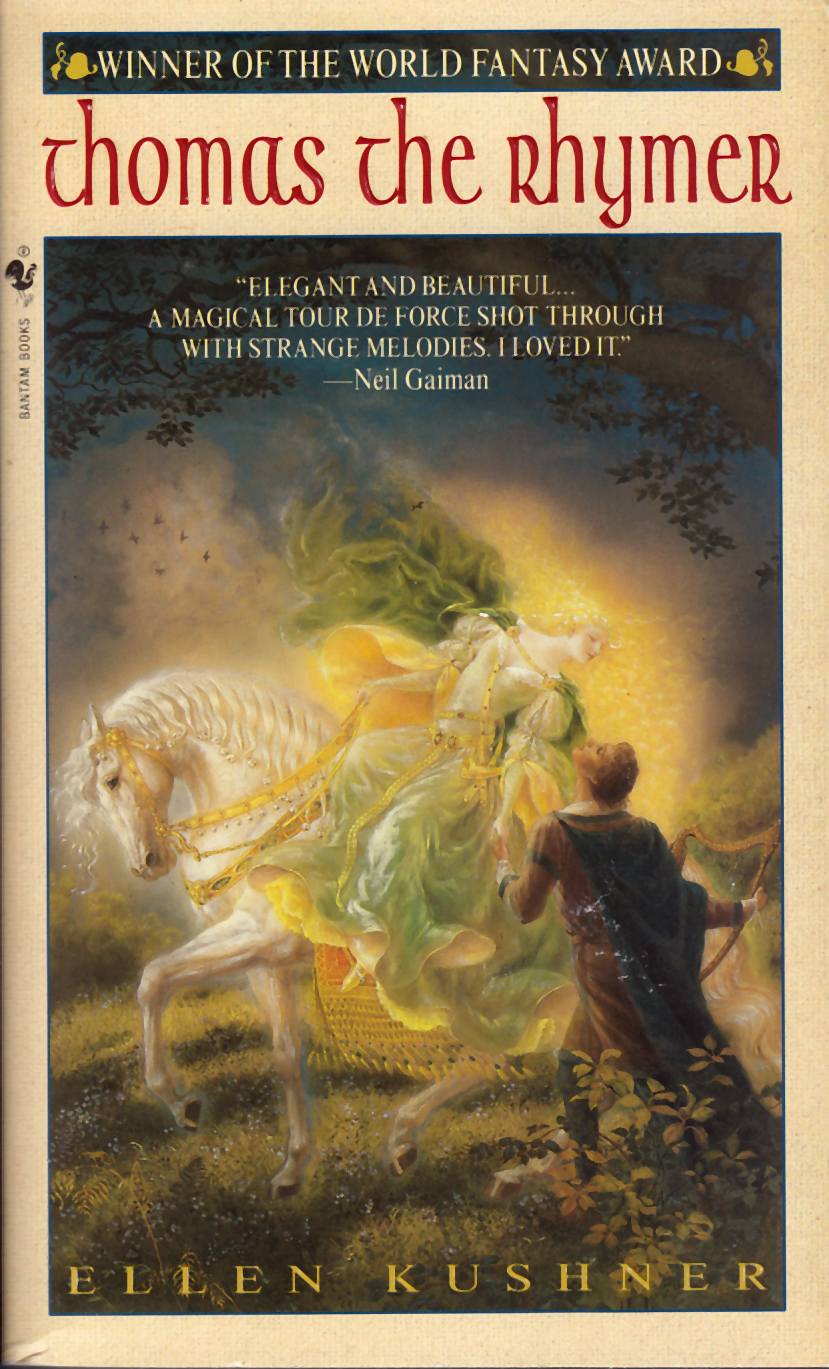 I thoroughly enjoyed Ellen Kushner's Swordspoint, so I was excited when I saw that Thomas the Rhymer was being re-released.
I thoroughly enjoyed Ellen Kushner's Swordspoint, so I was excited when I saw that Thomas the Rhymer was being re-released.
Thomas the Rhymer is one of the books that managed to be precisely what I want to read. The tale is of Thomas the Rhymer, minstrel who falls for the queen of Elfland. The story is told from four different points of view: The longest narrative is from the point of view of Thomas, but the other three are those around Thomas, two of whom are an older couple who take Thomas in.
Oddly, it is one of those characters, Meg, who I like the best. Something about her view of life seemed to resonate with me. Not that I disliked any of the characters--there was just something about Meg that I particularly liked.
The writing is beautiful, and the storytelling is wonderful--this was one of those books that I read in two days, because I just didn't want to put it down (one of the reason I tend not to read novels during the week and during the semester.) The food, the clothes, the atmosphere--usually I hate reading about things like that, but they seemed so important in this book that I didn't skip those parts like I sometimes do.
This is actually a novel based upon the folklore and myth surrounding Thomas the Rhymer, told in four parts. The first is told by Gavin, a crofter, living in the hills with his wife.
We learned more from him of his travels in the outside world, the sights he'd seen and the people he'd known. It was a s good as being there, without the bother.
That best sums up Gavin I think.
The second is told from the point of view of Thomas himself, and tells of his time in Elfland, and although it's the longest section, I think I prefer the other sections, where we see Thomas from the outside.
Though he does have his moments.
…the notes should be held a moment longer than the rhythm suggests, just as a person telling his grief pauses in pain before revealing it… until at least the sorry overwhelms him, and it comes rushing out, like waves onto the land.
The third part–Thomas' return from Elfland–is told Meg, Gavin's wife. I think she may be my favorite.
"Mistress," the minstrel frowned, "if you were any sharper, we could see you at the fair for scissors."
But she's not all tongue and sharp edges.
"Tom," Meg stopped in gravely, "don't say such things. Perfection isn't more mankind. Something might hear you."
The last section is told by Elspeth, Thomas' sweetheart and then wife, who still felt like a stranger when we came to her section. Hers was the hardest story: the woman left behind, and who had to make her own way thinking he would never return.
In the sleepless dark, all things are possible, the worst most likely, all darkness visible.
This story is like Swordspoint, a long stroll through magical lands. There is little action of adventure, just the lives unfolding.
One last line, that struck me as the way someone might describe me:
"If we get into Heaven on faith alone, she'll be shoveling coals for eternity."
I cannot recommend this book highly enough. I only wish that Ellen Kushner had more books out than the three I have already read.
Published by Bantam Books
- December 2004 | Rating: 9/10
- February 2013 | Rating: 9/10
Borderland: Where Magic Meets Rock and Roll (1986) edited by Terri Windling & Mark Alan Arnold
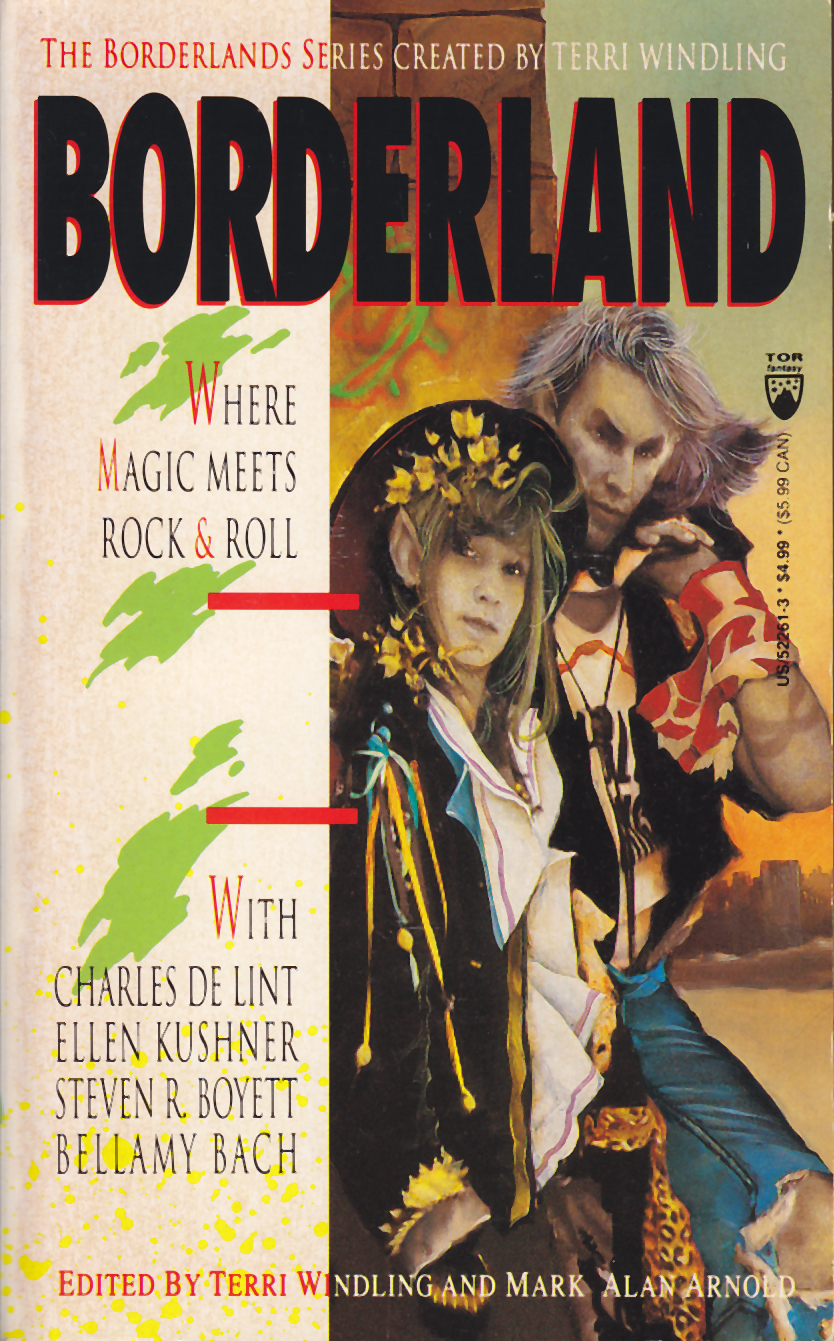 The Borderland anthologies contain stories by some of my favorite authors, in this volume Charles de Lint and Ellen Kushner contributed stories, along with Steven R Boyett and Bellamy Bach.
The Borderland anthologies contain stories by some of my favorite authors, in this volume Charles de Lint and Ellen Kushner contributed stories, along with Steven R Boyett and Bellamy Bach.
- Prodigy by Steven R. Boyett
- Gray by Bellamy Bach
- Stick by Charles de Lint
- Charis by Ellen Kushner
I've been a fan of shared world anthologies since Thieves' World, and although Borderlands is nowhere near close to Thieves' World (and some would say that's a good thing) in that there were not the shared characters and story lines that made TW so compelling, there were still four solid stories in this collection. One story was set in the past, soon after the world had been changed by the reappearance of Faerie, the other three stories were set in the present, long after the world had adjusted to the presence of Faerie and Bordertown became whatever it is that it became.
The first story, "Prodigy," was my least favorite. I had a hard time caring about Scooter. I saw why he did the things he did, but that was about it. And the last line of the story annoyed me to no end. I'd have punched him, had that been me.
The second story, "Gray" by Bellamy Bach, I liked better, although the shifting viewpoint confused me initially. And starting with Gray, the remainder of the stories were written from a female point of view. I have no idea if that affected my opinion of the stories, but I did like the remainder better.
I had high expectations for the last two stories, "Stick" by Charles de Lint, and "Charis" by Ellen Kushner, because I am particularly fond of their writing.
"Stick" seemed very familiar to me, so it's possible I read it in another anthology.
"Charis" was a story I know I had not read anywhere previously, and although I enjoyed it very much, it was painfully sad. Ellen Kushner had the teen female mindset down pat, but managed to keep her from being an annoying twit (that's a very hard line to walk, and many writers fail it.). So although it was good, it wasn't the most chipper ending for an anthology.
All in all, I'm glad someone was able to find a copy of this book for me, as it is long out of print, because I love reading new stories by Charles de Lint and Ellen Kushner, but it was somewhat dark, and I can see that it might not be for everyone.
Rating: 7/10
The Year's Best Fantasy and Horror: Seventh Annual Collection (1994) edited by Ellen Datlow & Terri Windling
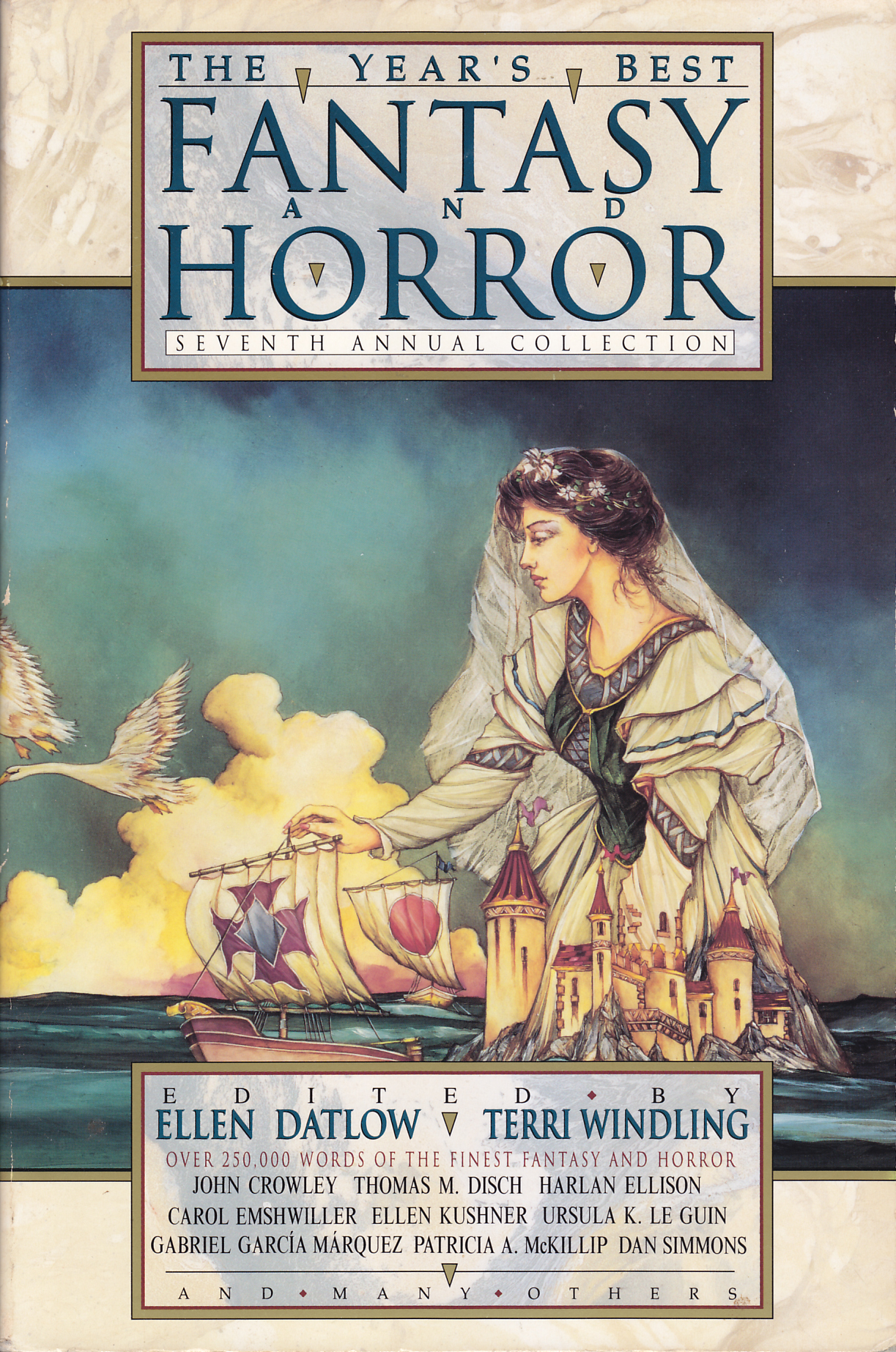 Playing with Fire by Ellen Kushner
Playing with Fire by Ellen Kushner
Published by St Martins Press
The Essential Bordertown (1998) edited by Terri Windling & Delia Sherman
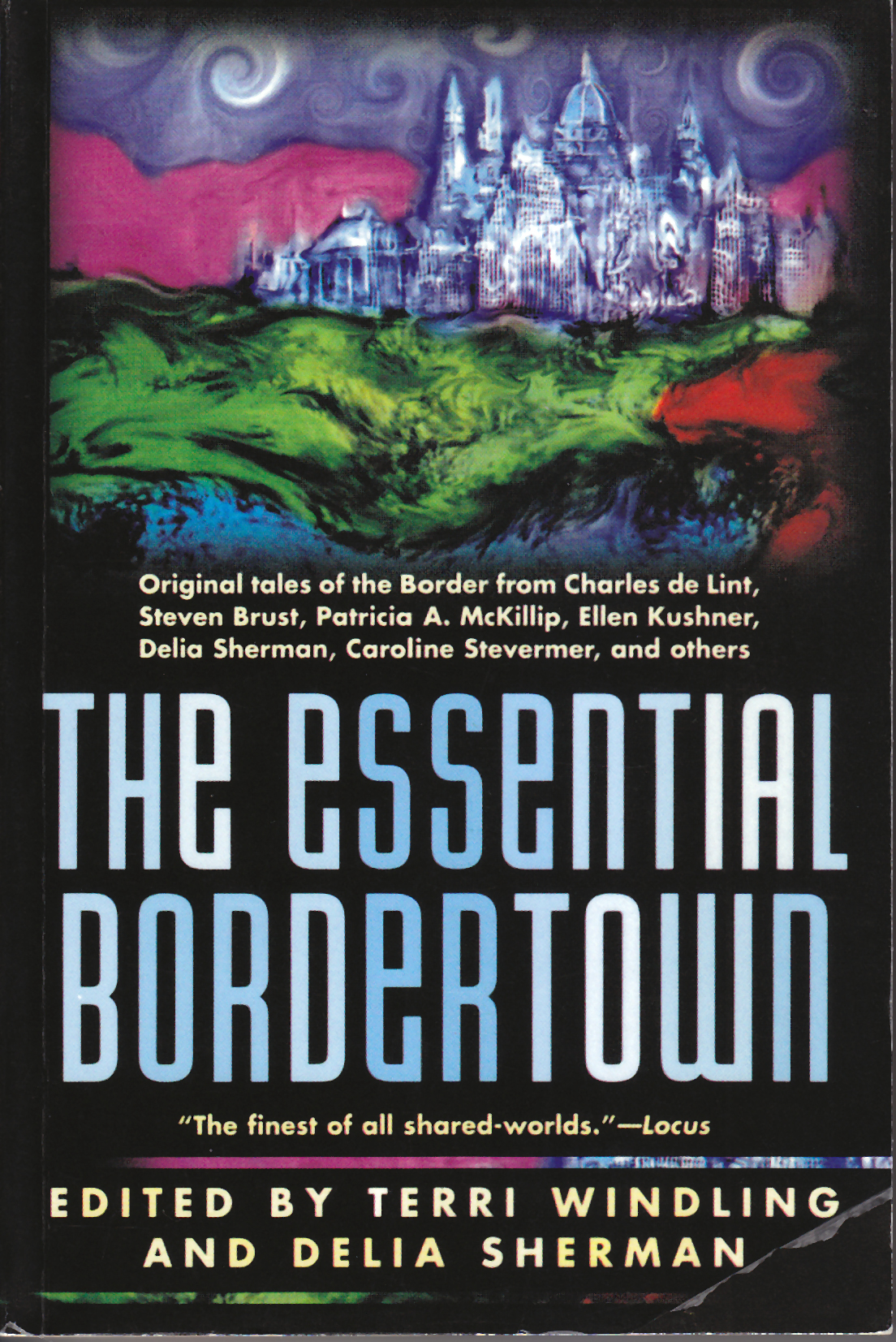 The Essential Bordertown is a collection of short stories set in Bordertown, the land between our world and Faerie. The stories are written with a teenage audiences in mind, with primarily teenage characters, and parts of a "traveler's guide" appearing before each chapter.
The Essential Bordertown is a collection of short stories set in Bordertown, the land between our world and Faerie. The stories are written with a teenage audiences in mind, with primarily teenage characters, and parts of a "traveler's guide" appearing before each chapter.
Bordertown strikes me as a cross between Sanctuary of Thieves' World and the world created by Charles de Lint. It's the area where faerie and the world of humans meets, and it's a strange place where neither magic or technology works properly, and although there are some places where elves and humans meet and get along, there are roving gangs of elves and humans who rule different parts of town, and woe to the opposite race who wanders into their territory.
- Oak Hill by Patricia A. Mckillip
- Dragon Child by Midori Snyder
- Socks by Delia Sherman
- Half Life by Donnard Sturgis
- Hot Water : A Bordertown Romance by Ellen Kushner
- Arcdia by Michael Korolenko
- Changeling by Elisabeth Kushner
- May This Be Your Last Sorrow by Charles De Lint
- Rag by Caroline Stevermer
- When The Bow Breaks by Steven Brust
- Argentine by Ellen Steiber
- Cover Up My Tracks With Rain by Micole Sudberg
- How Shannaro Tolkinson Lost And Found His Heart by Felicity Savage
Rating: 8/10
The Coyote Road: Trickster Tales (2007) edited by Ellen Datlow & Terri Windling
 I love short stories. Aside from collections by Charles de Lint, I best love anthologies by Ellen Datlow & Terri Windling best. Their books are like comfort food, and I save them up for when I'm sick or feeling low.
I love short stories. Aside from collections by Charles de Lint, I best love anthologies by Ellen Datlow & Terri Windling best. Their books are like comfort food, and I save them up for when I'm sick or feeling low.
In the same vein as The Green Man and The Faerie Reel, Datlow and Windling have this time collected stories about tricksters, and they've got some of my favorite authors in this collection: Charles de Lint, Nina Kiriki Hoffman, Ellen Kushner. As usual, they manage to collect stories by some of my favorite story tellers.
- One Odd Shoe by Pat Murphy
- Coyote Woman by Carolyn Dunn
- Wagers of Gold Mountain by Steve Berman
- The Listeners by Nina Kiriki Hoffman
- Realer than You by Christopher Barzak
- The Fiddler of Bayou Teche by Delia Sherman
- A Tale for the Short Days by Richard Bowes
- Friday Night at St. Cecilia's by Ellen Klages
- The Fortune Teller by Patricia A. McKillip
- How Raven Made his Bride by Theodora Goss
- Crow Roads by Charles de Lint
- The Chamber of Music Animals by Katharine Vaz
- Uncle Bob's Visits by Caroline Stevermer
- Uncle Tompa by Midori Snyder
- Cat of the World by Michael Cadnum
- Honored Guest by Ellen Kushner
- Always the Same Story by Elizabeth E. Wein
- The Senorita and the Cactus Thorn by Kim Antieau
- Black Rock Blues by Will Shetterly
- The Constable of Abal by Holly Black
- God Clown by Carol Emshwiller
- The Other Labyrinnth by Jedediah Berry
- The Dreaming Wind by Jeffery Ford
- Kwaku Anansi Walks the World's Web by Jane Yolen
- The Evolution of Trickster Stories Amount the Dogs of North Park after the Change by Kij Johnson
I didn't recognize "Honored Guest" as an Ellen Kushner story initially, until the dialog started to feel familiar and the name Campion came up. Then I belatedly realized that was the Ellen Kushner story. In a way, almost wish I hadn't recognized the name, because part of me felt the story was stronger for not being tied to that world.
But only a very small part of me.
Rating: 9/10
Troll's Eye View: A Book of Villainous Tales (2009) edited by Ellen Datlow & Terri Windling
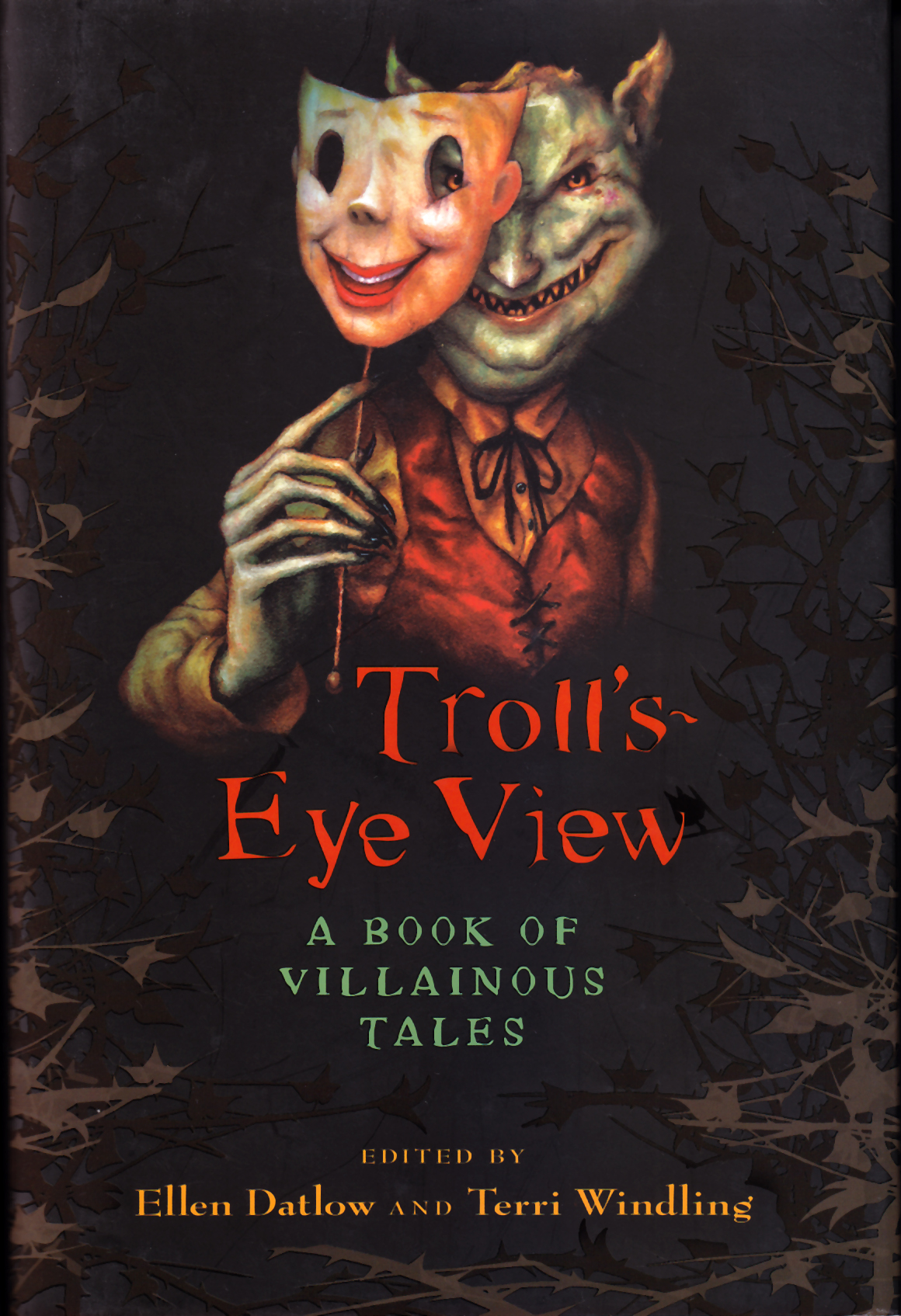
- "Wizard's Apprentice" by Delia Sherman
- "An Unwelcome Guest" by Garth Nix
- "Faery Tales" by Wendy Froud
- "Rags and Riches" by Nina Kiriki Hoffman
- "Up the Down Beanstalk: A Wife Remembers" by Peter S. Beagle
- "The Shoes That Were Danced to Pieces" by Ellen Kushner
- "Puss in Boots, the Sequel" by Joseph Stanton
- "The Boy Who Cried Wolf" by Holly Black
- "Troll" by Jane Yolen
- "Castle Othello" by Nancy Farmer
- "‘Skin" by Michael Cadnum
- "A Delicate Architecture" by Catherynne M. Valente
- "Molly" by Midori Snyder
- "Observing the Formalities" by Neil Gaiman
- "The Cinderella Game" by Kelly Link
Published by Viking Books for Young Readers
The Beastly Bride: Tales of the Animal People (2010) edited by Ellen Datlow & Terri Windling
- "Island Lake" by E. Catherine Tobler
- "The Puma's Daughter" by Tanith Lee
- "Map of Seventeen" by Christopher Barzak
- "The Selkie Speaks" by Delia Sherman
- "Bear's Bride" by Johanna Sinisalo
- "The Abominable Child's Tale" by Carol Emshwiller
- "The Hikikomori" by Hiromi Goto
- "The Comeuppance of Creegus Maxin" by Gregory Frost
- "Ganesha" by Jeffrey Ford
- "The Elephant's Bride" by Jane Yolen
- "The Children of Cadmus" by Ellen Kushner
- "The White Doe Mourns Her Childhood" by Jeanine Hall Gailey
- "The White Doe's Love Song" by Jeanine Hall Gailey
- "The White Doe Decides" by Jeanine Hall Gailey
- "Coyote and Valorosa" by Terra L. Gearheart
- "One Thin Dime" by Stewart Moore
- "The Monkey Bride" by Midori Snyder
- "Pishaach" by Shweta Narayan
- "The Salamander Fire" by Marly Youmans
- "The Margay's Children" by Richard Bowes
- "Thumbleriggery and Fledglings" by Steve Berman
- "The Flock" by Lucius Shepard
- "The Children of the Shark God" by Peter Beagle
- "Rosina" by Nan Fry
Viking Books for Young Readers
Naked City (2011) edited by Ellen Datlow
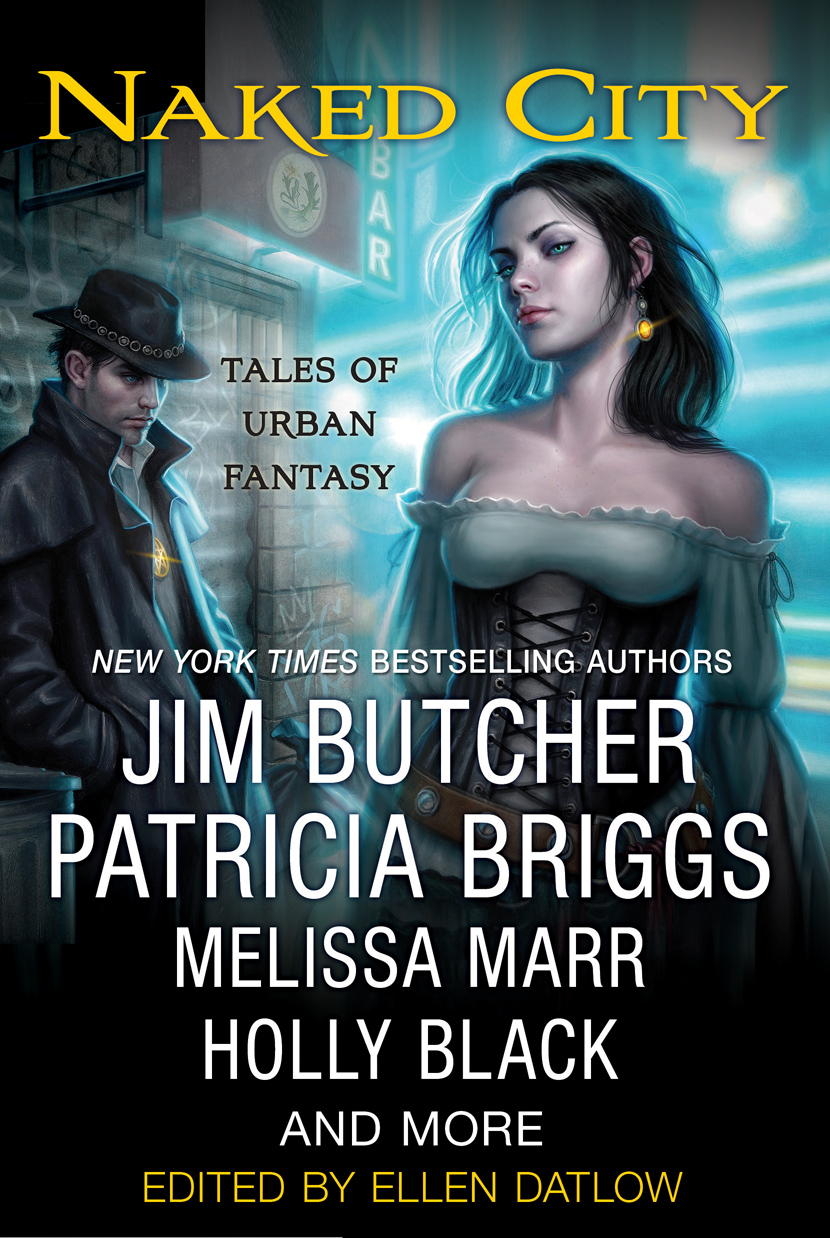 This collection of urban fantasy stories has several of my favorite authors, so it was a no-brainer to get. The bad thing is that I've been reading this collection for several months, so I now have no idea what the stories at the start of the anthology were about, which is dangerous, because it means I may end up accidentally rereading several of them.
This collection of urban fantasy stories has several of my favorite authors, so it was a no-brainer to get. The bad thing is that I've been reading this collection for several months, so I now have no idea what the stories at the start of the anthology were about, which is dangerous, because it means I may end up accidentally rereading several of them.
- Curses by Jim Butcher
- How the Pooka Came to New York City by Delia Sherman
- On the Slide by Richard Bowes
- The Duke of Riverside by Ellen Kushner
- Oblivious by Calvin Klein by Christopher Fowler
- Fairy Gifts by Patricia Briggs
- Picking up the Pieces by Pat Cadigan
- Underbridge by Peter S. Beagle
- Priced to Sell by Naomi Novik
- The Bricks of Gelecek by Matthew Kressel
- Weston Walks by Kit Reed
- The Projected Girl by Lavie Tidhar
- The Way Station by Nathan Ballingrud
- Guns for the Dead by Melissa Marr
- And Go Like This by John Crowley
- Noble Rot - Holly Black
- Dady Longlegs of the Evening by Jeffrey Ford
- The Skinny Girl by Lucis Shepard
- The Colliers' Venus by Caitlan R Kiernan
- King Pole, Gallows Pole, Bottle Tree by Elizabeth Bear
Worth the cost of the anthology alone was Ellen Kushner‘s "The Duke of Riverside." I love Swordspoint, and the chance to read more about St. Vier and Alec met? Bliss.
Although there were several stories I didn't care for, I believe that was more a matter of personal taste than quality. And the stories I did like, I liked very much.
Published by St. Martin's Griffin
Rating: 8/10
Teeth: Vampire Tales (2011) edited by Ellen Datlow & Terri Windling
 This is an Ellen Datlow and Terri Windling anthology, so as always, there are fascinating bits of folklore.
This is an Ellen Datlow and Terri Windling anthology, so as always, there are fascinating bits of folklore.
Rice, not garlic, was the most effective means of keeping Chinese vampires at bay, for they had a strange compulsion to count. Throwing rice at the ghost compelled it to stop; it would not move again until each grain was counted.
- "Things to Know About Being Dead" by Genevieve Valentine
- "All Smiles" by Steve Berman
- "Gap Year" by Christopher Barzak
- "Bloody Sunrise" by Neil Gaiman
- "Flying" by Delia Sherman
- "Vampire Weather" by Garth Nix
- "Late Bloomer" by Suzy McKee Charnas
- "The List of Definite Endings" by Kaaron Warren
- "Best Friends Forever" by Cecil Castellucci
- "Sit the Dead" by Jeffrey Ford
- "Sunbleached" by Nathan Ballingrud
- "Baby" by Kathe Koja
- "In the Future When All's Well" by Catherynne M. Valente
- "Transition" by Melissa Marr
- "History" by Ellen Kushner
- "The Perfect Dinner Party" by Cassandra Clare & Holly Black
- "Slice of Life" by Lucius Shepard
- "My Generation" by Emma Bull
- "Why Light?" by Tanith Lee
"History" by Ellen Kushner is the story of a history student in love with a vampire, and her frustration with his inability to remember events she desperately wants to know more about.
As always, she writes lines that I love:
He did have a cold once, for a couple of hours. He said he picked it up on the street. And that people should be forced to wear tags on their collars saying, DON'T BITE ME I'M DISEASED.
So in theory, people with allergies could keep themselves from being bitten by vampires, by pretending to have colds. That amuses me to no end.
Published by Harper Collins
Rating: 8/10
Under My Hat: Tales from the Cauldron (2012) edited by Jonathan Strahan
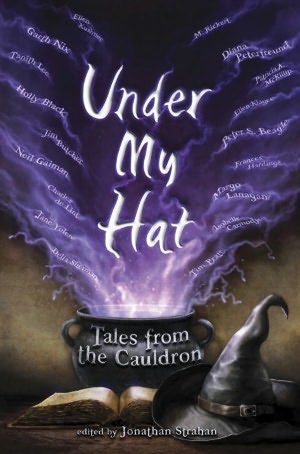 This is a lovely YA anthology, with some amazing stories by some of my favorite authors. I didn't love all the stories, but none of them were bad. The theme is young witches coming of age, but the stories are far greater than that.
This is a lovely YA anthology, with some amazing stories by some of my favorite authors. I didn't love all the stories, but none of them were bad. The theme is young witches coming of age, but the stories are far greater than that.
- Stray Magic by Diana Peterfreund
- Payment Due by Frances Hardinge
- A Handful of Ashes by Garth Nix
- Little Gods by Holly Black
- Barrio Girls by Charles de Lint
- Felidis by Tanith Lee
- Witch Work by Neil Gaiman (poem)
- The Education of a Witch by Ellen Klages
- The Threefold World by Ellen Kushner
- The Witch in the Wood by Delia Sherman
- Which Witch by Patricia A. McKillip
- The Carved Forest by Tim Pratt
- Burning Castles by M. Rickert
- The Stone Witch by Isobelle Carmody
- Andersen's Witch by Jane Yolen
- B Is for Bigfoot by Jim Butcher
- Great-Grandmother in the Cellar by Peter S. Beagle
- Crow and Caper, Caper and Crow by Margo Lanagan
Elle Kushner is another who seems incapable of writing a story I don't love. "The Threefold World" is the story of Elias Lönnrot becoming a great Finnish scholar. It is very similar in some ways to Jane Yolen's story, "Anderson's Witch" in that both take historical figures and imagine how they came to study and write about the other realms. Both stories are very very good.
Published by Random House
Rating: 9/10
Queen Victoria's Book of Spells: An Anthology of Gaslamp Fantasy (2013) edited by Ellen Datlow and Terri Windling
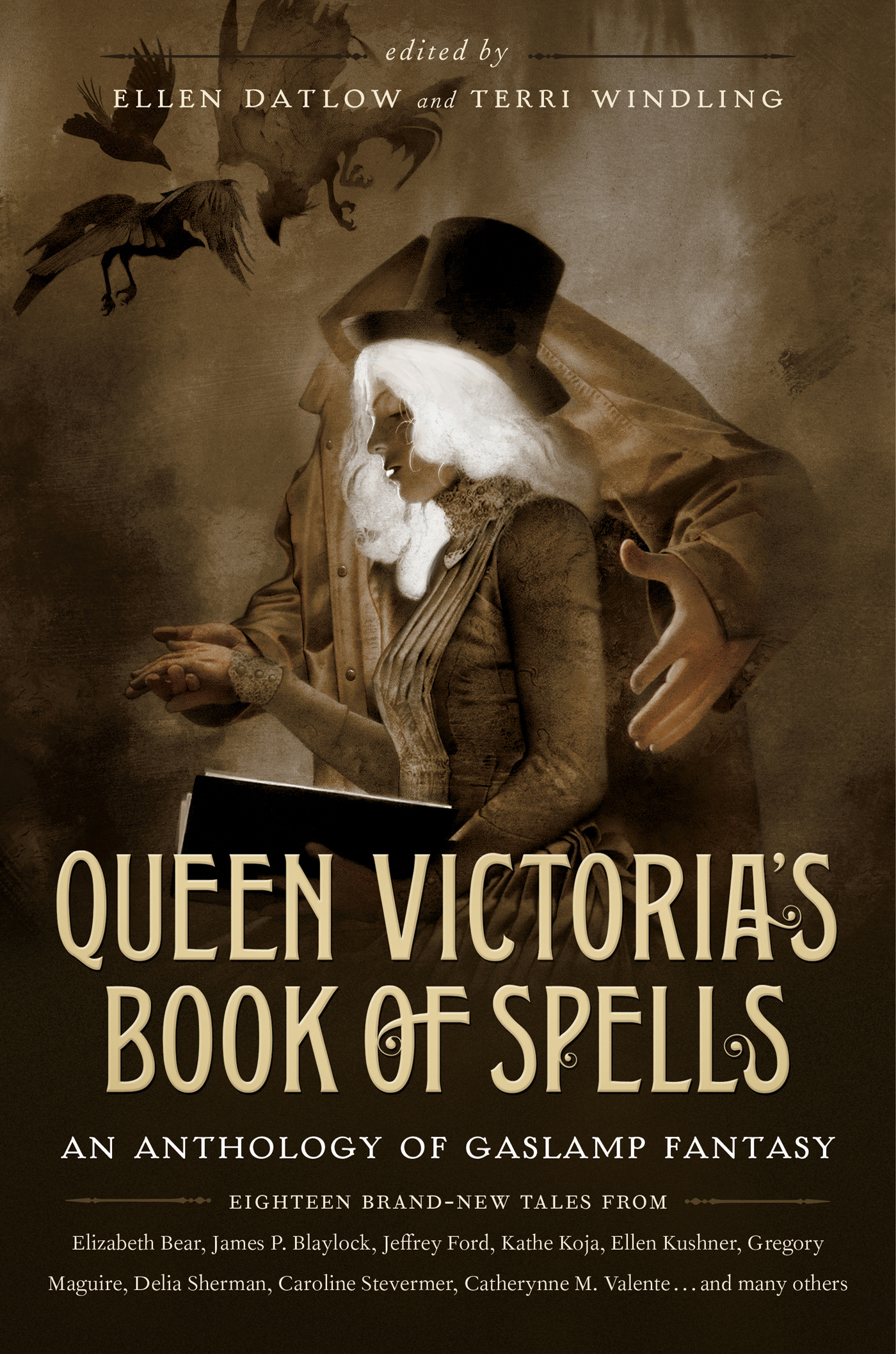 The Vital Importance of the Superficial by Ellen Kushner and Caroline Stevermer
The Vital Importance of the Superficial by Ellen Kushner and Caroline Stevermer
I love anthologies and I love historical fiction. So this should have been an automatic win for me.
Instead it was a two-plus year slog that I finally forced myself to finish.
- Queen Victoria's Book of Spells by Delia Sherman
- The Fairy Enterprise by Jeffrey Ford
- From the Catalogue of the Pavilion of the Uncanny and Marvellous, Scheduled for Premiere at the Great Exhibition (Before the Fire) by Genevieve Valentine
- The Memory Book by Maureen McHugh
- La Reine d'Enfer by Kathe Koja
- For the Briar Rose by Elizabeth Wein
- The Governess by Elizabeth Bear
- Smithfield by James P. Blaylock
- The Unwanted Women of Surrey by Kaaron Warren
- Charged by Leanna Renee Hieber
- Mr. Splitfoot by Dale Bailey
- Phosphorus by Veronica Schanoes
- We Without Us Were Shadows by Catherynne M. Valente
- The Vital Importance of the Superficial by Ellen Kushner and Caroline Stevermer
- The Jewel in the Toad Queen's Crown by Jane Yolen
- A Few Twigs He Left Behind by Gregory Maguire
- Their Monstrous Minds by Tanith Lee
- Estella Saves the Village by Theodora Goss
The Vital Importance of the Superficial by Ellen Kushner and Caroline Stevermer.
Without exactly saying so directly, I assured him I would do no such thing. Miss Prism's Academy trained us well for some situations, and saying no without ever using the word was a large part of our curriculum.
Published by Tor

